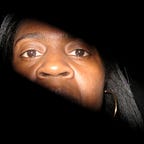by R.L. Gadsden
How does one define the word “death”? For me, the word means the end of something. For many, it means the end of a life. This is what the word is commonly known for. But the word “death” can come to mean more than the demise of life.
For me, death means something more viable. This form of death occurred right around the COVID-19 lockdowns in March of last year and the virus was not the reason. It was the final time I menstruated. Over the past few months, my menstrual cycle (aka “time of the month”, “the curse”, or as Cher Horowitz called it in the film Clueless “the crimson rush”) came sporadically. When it didn’t return in April, May, June, July and throughout the year 2020 and the beginning of 2021, it was officially over.
Although my chances of becoming pregnant was minimal at best, it was always there. It played into that other menstrual phrase, “my friend”, even though I didn’t know many “friends” who would force me to insert numerous cotton devices up my vagina near my uterus and to ingest numerous pain pills over the years until a surgery I had forbade it, the menstrual cramps.
Cramps were the one part of the “friendship” which no woman wants. But like a friend, you have both good days and bad days with them. The first day of the cycle was like a minor call from your friend blabbering about a family member you didn’t want to talk about. On the second day, it’s the anger you feel when your “friend” is having a relationship with your intended behind your back. You feel the pain, the anger, and the rage. The third day is a soreness you feel after you confronted that friend who does everything in their power to console, apologize, and atone for their sins. In a way, the physical and emotional aspects of your monthly friends embody this comparison.
Now like many who lament and mourns a human friend, I am mourning that friend inside my body which I met as a 13-year-old. A friend who has been with me through numerous health issues, including a time where my friend wouldn’t stop bleeding for a month without stoppage. When my health issues subsided, it knew when to stop and return to a regular cycle.
But what hurts the most about the loss of my friend is how people, particularly the opposite sex will look on me without my friend of nearly 44 years. I’m a rarity for my age; I am single. I’ve never been married or divorced. Perhaps having a father, who I put on a pedestal, is tough for any man to live up to. But when a man without children may want a physical relationship with me, it may not work, especially if he’s a few years my junior in age. The problem may come when he may want biological children and I won’t be able to fulfill this need. If this is to his satisfaction, then perhaps being alone might be the best thing.
Family members such as my own when seeing my situation as a middle-aged bachelorette always ask those intrusive questions: Who will take care of you in your final years? Who will be left when you are gone? What will be your “legacy”? I tell people my “legacy” will be that I was a good person who tried to take care of those who were there for me. Hopefully, when that time comes, it will be reciprocated. I was here on earth, and this could also be a part of that particular “legacy”.
Now of course, the question no one has asked: did you want to become a mother? An extremely small part of me always wondered what it would be like to become pregnant, carry a child for a full-term pregnancy, raise a child from baby to adulthood, watch them start a family and so on. But a large part of me didn’t see myself as a mother. Perhaps selfishness has something to do with it. I enjoy my freedom and solitude and yes, I do enjoy the company of a few real friends that I trust. Also, I didn’t see myself dealing with life unexpected: a possible childhood illness, a disability, or something out of the ordinary. Some people could handle this. I just remember how devastated I was when the family pet was diagnosed with diabetes and watch his inevitable decline.
Death can be sudden. Death can also be prolonged. But death of a particular thing doesn’t have to mean life is over. Menstruation is a part of many of woman’s life. And when menopause hits a woman’s body at that time of life, it should begin another chapter instead of closing a book forever. I really shouldn’t say that menopause is “death” per say; however, it does mean that something eventually comes to an end.
On one hand, I took the gift of womanhood for granted. On the other, I realized that not being a “natural” mother doesn’t mean you don’t have maternal feelings. As an adjunct instructor for nearly 16 years at several colleges and universities, I’ve seen my “mothering” skills in use for over 700 students I have taught composition to and over 100 international students making sure their English as a second language can be used throughout the world. It is through them that I believe I have fulfilled my maternal duties. I may not have given birth to them, but like any mother bird, I nourished them with knowledge and sent them off out of the nest and into the world.
Like many across the world, I did mourn a death of some kind. I eulogize my menstrual cycle the best way I could. You were a good friend through pain and recovery.
Godspeed!
Menstrual Cycle
October 1976 — March 2021
